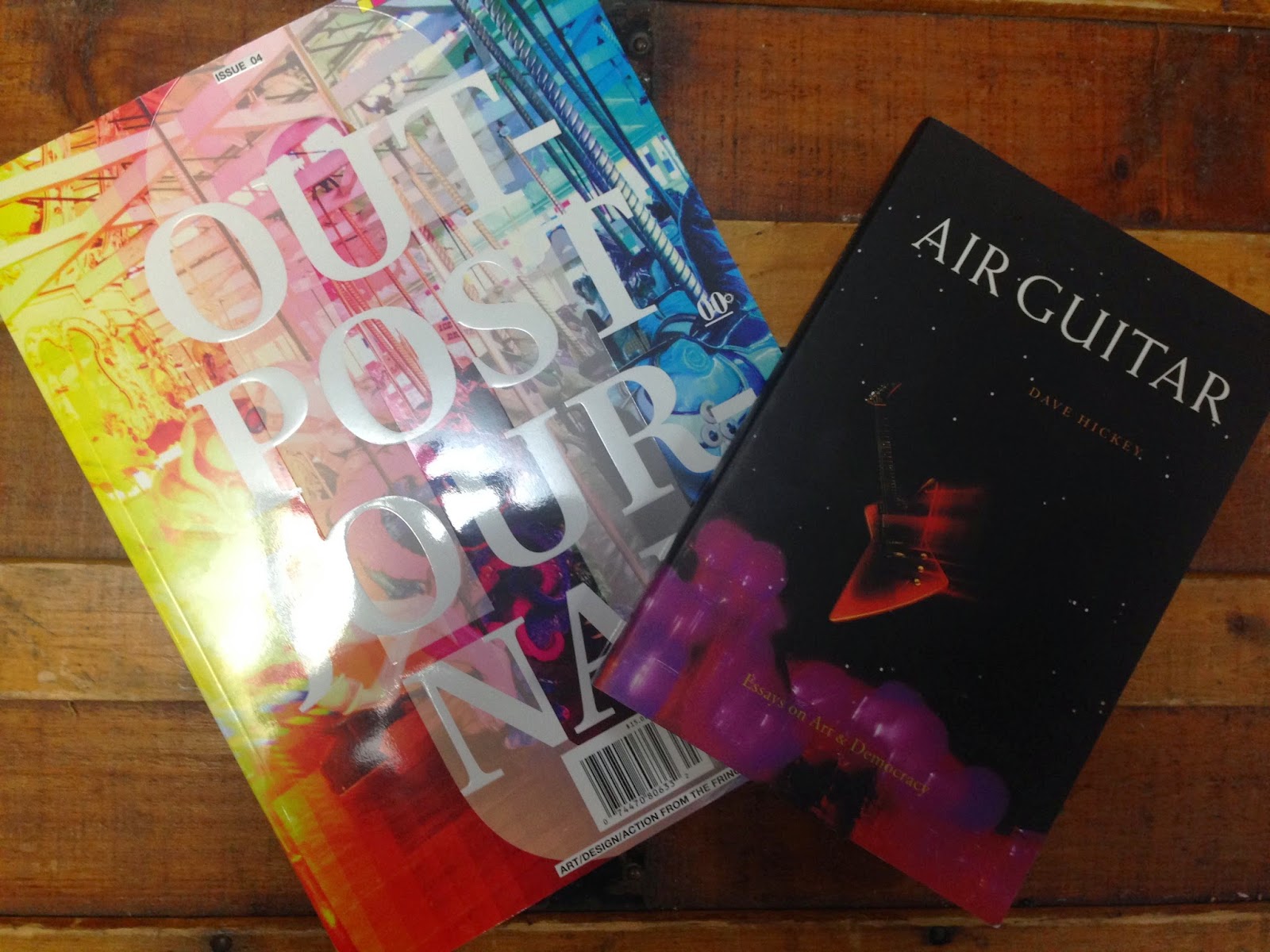Hello, dear reader! First, I would like to apologise for
neglecting to do my bloggerly duty these past couple weeks. I’ve just started a
new job, and I’m still trying to find a good time to get things like writing done with my new
schedule. It’s also been a little too hectic for me to find the time to
properly visit new exhibitions, though I hope that'll change soon. Anyways, in light of the fact that I’ve had much more
book time than museum these days, I thought I’d write a quick update to share
with you what I’ve been reading these days.
Air Guitar: Essays on Art and Democracy. By Dave Hickey.
Art Issues Press. 1997.
I read Air Guitar on the recommendation of Sarah Green over at the Art Assignment, and it’s just as good as she promised. Taken together, the essays form a discourse on the role and
purpose of art in an everyday setting, ranging from its role in a democracy to how we interact with it. Although
Hickey does spend some time discussing art markets and institutions, they
really only exist in the book as a counterpoint to his real interest: what art
can mean for a society. Within this general umbrella, Hickey shares personal
stories and relates lessons that he’s learnt over his long career in the art
business.
In one of his first essays, he
brings up the idea that, with the internet and social media, has become more and
more relevant since the book was published in 1997: the notion of communities
of desire, or groups of people who come together for the sole purpose of sharing
a common interest. Another one of points
I particularly liked wasn’t about fine art at all but rather concerned the role
of cars in culture and the meaning of modifications. In university, I studied and wrote
about cars a little bit while taking a module on French art (specifically the Citroën DS) and that side of art history has been really compelling for
me since. Hickey takes it one step further, asking the reader to consider how modifications can be a form of social dissent.
What I really loved about
Hickey’s book is his instance that culture is a public business, that it's all around us all the time, and that we all
should be striving to be a participant. It isn’t enough to merely be a
spectator, to just observe the world around you and the things that populate
it. Instead, you should think critically with an open mind and always seek to
engage as fully as possible. It’s a book, just as Sarah Green promised, that reminds
you of all the many, many things art can be and shows you that there’s no limit
to how it can be discussed and considered.
Some Memorable
Quotes:
“Nor have I had any experience with high art that was not
somehow confirmed in my experience of ordinary culture- that did not, to some
extent, reform and redeem that.”
“When colour signifies anything, it always signifies as
well, a respire from language and history.”
“Authenticity is something you bump into while you’re
backing up to look at something that interests you.”
“There are no prerequisites for looking at art.”
Outpost: Art/Design/Action from the Fringes. Issue 4: Providence.
Eds. Maya K. Rubinstein and Pete Oyler.
I picked up
this journal while visiting the Rhode Island School of Design’s museum for one
of their late nights. When I lived in
Providence two summers ago, going to RISD on that Thursday evening was always
one of my favourite things to do. There's always great food trucks outside,
wine to be had inside, and plenty of new and interesting art to learn about. This time around, however, I actually found myself more drawn to something else: a launch party that was happening on
one of the upper floors—that night, people had gathered to
celebrate the release of the Providence edition of a journal called Outpost. I hadn’t heard of it before,
but it only took me about three seconds to realise that it was right up my
alley.
As the name
would suggest, Outpost is concerned
with the fringes of the art world— places outside of New York, London, etc where
exciting and unique art is being made. In that regard, it deals with the effect
of being on the outside of the main movement.
In a lot of ways, Outpost touches on exactly the sort of
thing that I love about Scottish art- the goal of creating horizontal rather
than vertical artistic relationships, the role of the local community within a
globalised world, the fight against homogenisation while still recognising that the
global population brings new possibilities for meaningful cross cultural
collaboration.
Of course, this edition
especially spoke to me since it centred on Providence. I lived in Providence
just after I discovered that I really loved modern art, and it’s where I started to discover artistic communities and new
artists for myself. Even without that personal connection, Providence is a really
compelling artistic city. It has a unique political history and long tradition of
craftsmanship combined with a lack of institutional support. Together, that
creates a rich breeding ground for unique, well made art that is free to push boundaries and consider new horizons.
Looking at specific artist and
communities, Outpost attempts to
relate to the reader how all these factors combine into a real community that
values craftsmen ship, individual agency, collaboration, and experimentation. They seem to be a new journal, as this is only their 4th issue, but as the publication is beautiful and the content insightful, I'm sure this won't be the last time I come across their work.
A Memorable Quote:
“The idea of creative culture becoming too well developed or
documented- even by seemingly well meaning groups of individuals- is anathema
to some … There is a specific fear that formalising culture may well destroy
it.”












0 comments:
Post a Comment